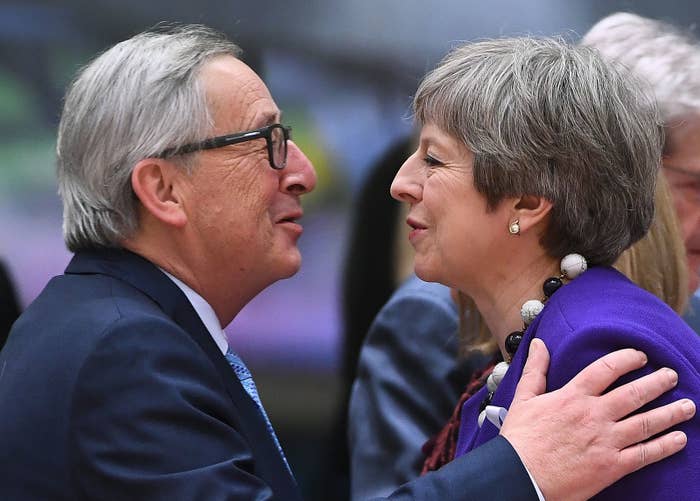
A series of government papers on a “no deal” Brexit, expected to be published from next week, will cover more than 80 specific subjects ranging from blood safety to fertilisers to driving licenses, according to a provisional list leaked to BuzzFeed News.
The list – drawn together from departments across Whitehall – underlines the scope of the potential disruption to British life if the UK crashes out of the European Union in March without a withdrawal agreement. And it starkly illustrates the extent of the challenge facing officials who have been ordered to prepare for such an outcome.
Some of the reports, judging by the subject headings, will be sweeping in scope – such as those covering financial services and climate – while others will be highly specific. One report, for example, is expected to be dedicated to how a no-deal Brexit would affect the ability of UK citizens to travel with their pets.
Under current plans, the reports will be published in batches, starting as early as next week and running through September, although the timetable could slip, people familiar with the documents said.
Last month, Theresa May told a parliamentary committee there would be around 70 “technical notifications” published to advise individuals and businesses on how to prepare for a no-deal Brexit.
But the number of reports to be published appears to have increased, according to the list seen by BuzzFeed News. The subjects they will cover are:
- Air services
- Animal breeding
- Aviation safety
- Aviation security
- Batch testing of medicine
- Blood safety
- Broadcasting
- Chemicals regulation
- Civil judicial cooperation
- Civil nuclear
- Climate
- Commercial road haulage
- Common Travel Area
- Company law
- Competition
- Consumer protection
- Cross-border gas trading
- Customs and borders
- Data
- Driver licensing
- Drugs
- e-Commerce and geo-blocking
- Electricity trading
- Environmental standards
- Equine movements
- Erasmus
- EU citizens in the UK
- EU programmes and structural funds
- EU space programmes
- European regional development fund
- European social fund
- Export control regulation
- Fertilisers
- Financial services
- Firearms
- Fisheries, fish and seafood
- Fluorinated gases and Ozone depleting substances
- Food labelling
- Genetically modified organisms
- Geographical indicators
- Health and identification marks for products of animal origin
- Horizon 2020
- Imports of food and feed
- Insolvency
- Intellectual property
- Life sciences
- Live animals and animal products
- Maritime security
- Motor insurance
- New car and van CO2 emissions
- NGOs
- Nuclear research
- Objects of cultural interest
- Oil and gas
- Organic food production
- Organs, tissue, and cells
- Passports
- Payments to farmers
- Pesticides regulations
- Pet travel
- Plants and seeds
- Procurement
- Product regulation
- Registration of veterinary medicines
- Renewable electricity issues
- Rural Development Programme for England
- Seafarer certification
- Services
- State aid
- Telecoms
- Timber trade
- Tobacco
- Trade agreements continuity
- Trade in endangered species
- Trade remedies
- Trans-European energy infrastructure
- UK citizens in the EU
- UK LIFE projects
- UK trade tariff
- Upholding industrial emissions
- VAT
- Vehicle standards
- Veterinary medicine products
- Workplace rights

The reports are the product of a cross-Whitehall initiative ordered by the former Brexit secretary David Davis to ensure that the UK was prepared to leave the EU without a deal in the event that the Brexit negotiations broke down – and that its preparedness was visible.
Roughly half of the reports relate to matters overseen by either the Department for Environment, Food and Rural Affairs (Defra) or the Department for Business, Energy and Industrial Strategy (BEIS). The Department for Transport also accounts for a significant number of the matters covered.
Some of the most challenging issues, relating to customs and borders, fall under the umbrella of HMRC.
BuzzFeed News understands that the reports have been carefully written in a neutral, factual tone. The government has been accused repeatedly of scaremongering when it has released materials to bolster its arguments on Brexit, and the preparations for leaving without a deal are already highly volatile politically.
Nevertheless, officials are worried that some of the detail in certain reports will come as a shock to the public.
Fears about gridlock at customs borders such as Dover have already been widely aired, but the officials are concerned that people will have given far less thought to, for example, whether they’ll be able to legally drive in the EU with a UK driving license or to transport their dogs, cats and ferrets without having them quarantined, if Britain doesn’t secure an exit deal.
How do I tell them?? #Brexit
The Sunday Times has reported that Britain will be hit by shortages of medicine, fuel and food within a fortnight if the UK leaves the EU without a deal, according to a scenario drawn up by DExEU. Supermarkets and facilities in more distant locations, such as Cornwall and Scotland, would be the hardest hit. The newspaper also reported that ministers have prepared plans to send in the army to deal with the shortages, and deliver food, medicines and fuel.
In publishing the documents now, the government hopes to re-frame the political debate about Brexit.
Eurosceptic Tories argue that Britain’s negotiating hand will be strengthened if Brussels believes that it is genuinely willing to walk away from the talks without a deal. Some even believe that a no-deal Brexit is preferable to the agreement May is pursuing. These Eurosceptics are angry that the government hasn’t done more to prepare for such an eventuality.
By showing the serious consequences that crashing out without a deal will have on so many aspects of British life, the government hopes to silence those critics. It will also pray that publishing its analyses gives some reassurance to businesses that have been demanding more clarity so that they can prepare contingency plans.
The reports come at a delicate time in the negotiations. The chances of a no-deal have shot up since Theresa May’s Chequers agreement last month. Latvia’s foreign minister recently put the odds at 50:50, while UK international trade secretary, Liam Fox, sees the chances of a no deal at 60%. Bank of England governor Mark Carney has described the possibility of a no-deal Brexit as "uncomfortably high."
A DExEU spokesperson said: “We don't comment on leaks or speculation. However, as we've already made clear, individual departments are preparing specific technical notices to help citizens, businesses and consumers to prepare for March 2019 in the unlikely event of a no-deal scenario. This is part of our preparatory work that has been underway for the past two years.
"These will be published in August and September and will be available on gov.uk in a centralised location that is easy for people to access and use. The secretary of state for exiting the EU [Dominic Raab] and the prime minister confirmed this in July.”

